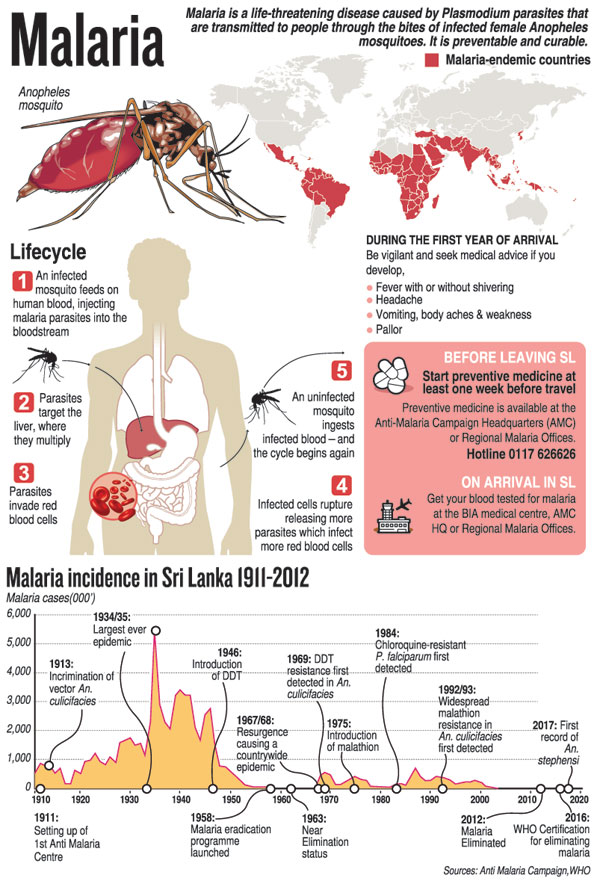News
Keep the menace of malaria at bay in SL
View(s):- “Imported’ cases could result in disaster on the anti-malaria-front, warns expert
- Take the free preventive medicines offered when travelling to malaria-endemic countries; get your blood checked for the disease on your return; & disclose travel history if ill

Dr. Champa Aluthweera
By Kumudini Hettiarachchi
Fever and a travel history out of Sri Lanka – suspect malaria.
This is the strong appeal by the Director of the Anti-Malaria Campaign (AMC), Dr. Champa Aluthweera who along with other officials is very concerned over the possibility of this terrible mosquito-borne disease re-establishing its grip over Sri Lanka.
In 2016, after a ‘up and down’ battle with malaria lasting over 100 years, the World Health Organization (WHO) declared Sri Lanka as having ‘eliminated’ malaria. This means that the country has no indigenous (arising from within) infections.
Now Sri Lanka is in the ‘Prevention of Re-establishment’ (PoR) phase but danger lurks near, for ‘imported’ cases could result in disaster on the anti-malaria-front. Even though the country has eliminated the parasite, the mosquito vector is still very much around.
The appeal to ‘suspect’ malaria when a person presents with fever and a travel history to a malaria-endemic country goes out to all doctors at the grassroots including General Practitioners (GPs) as well as junior and senior doctors in the state and private sector hospitals.
Dr. Aluthweera requests all those who are going into a malaria-endemic country or have returned from one, to take a few simple but responsible actions not only to protect themselves and their families but also society and Sri Lanka.
The AMC headquarters located at Narahenpita adjacent to the National Blood Transfusion Service (NBTS) building provides prophylactic medication free of charge to all those who are heading to malaria-endemic countries, while the country’s 25 districts also have Regional AMC offices which do the same, it is learnt. When handing out these preventive medicines, health personnel would also be able to keep a register and monitor these travellers on their return for their own protection.
The AMC Director stresses that once a person returns if afflicted by fever during a time span of one year, malaria should be suspected along with other diseases such as dengue.
“Be honest with your doctor about your travel history,” she urges, explaining that a simple test can help diagnose malaria so that it can be treated promptly. This would protect the patient and also help to stop the spread of malaria.
All these urgent efforts are needed in the light of the identification of 15 ‘imported’ cases of malaria from January up to now (May) in Sri Lanka. Of the 15 cases, one is a foreigner, while tragically a Sri Lankan businessman from Beruwala has died. This death could have been prevented if diagnosed correctly.
The Sunday Times understands that the 37-year-old businessman, a father of three, had returned from Tanzania on April 10 with fever. He had sought treatment from three doctors in his area, followed by admission to a small private hospital in Colombo and a transfer to a large private hospital also in Colombo. The test for malaria had been done at the large private hospital but the businessman had succumbed the same day, April 15. Further investigations are underway into this death.
The high-risk groups which could ‘import’ malaria to Sri Lanka include:
Sri Lankan business travellers
Sri Lankan armed forces personnel deployed on UN missions
Sri Lankan gem traders who travel to Africa
Pilgrims
Asylum seekers and refugees
Foreign visitors to Sri Lanka
While in our region, only Sri Lanka and the Maldives have eliminated malaria, the disease is very much around in other neighbouring countries as well as farther across the seas such as in Africa and Latin America.
| Need for border vigilance The danger of malaria could explode in Sri Lanka now that tourists are coming into the country and a ferry service has been launched between Pondicherry in India and Kankesanthurai in Sri Lanka, many experts warned. They pointed out that though Sri Lanka eliminated malaria in 2016 and the parasite has been eliminated, the mosquito vector flies free. If the parasite is brought into the country in any form, there could be a vector infestation which could set off a wave of malaria. This is why border vigilance is of paramount importance. “Bitter have been the battles Sri Lanka has waged against malaria. The elimination needs to be further strengthened to prevent re-establishment with all fronts being looked at closely. These also include the provision of medicines, rapid diagnostic testing and insecticides,” one expert said, looking at history and the terrible photographs of very sick men, women and children struck down by malaria, especially in the epidemic of 1934-35 .
| |
 1934 / 35: Child with post malaria edema Don’t let history repeat itselfDistant and very recent history should give a red alert about malaria to the authorities, cautioned many experts. The major mosquito vector which transmitted these parasites in Sri Lanka has been identified as Anopheles culicifacies with Anopheles subpictus, Anopheles annularis and Anopheles varuna being considered as potential vectors. 2023 (up to now) – 15 ‘imported’ cases reported. The Sunday Times learns that Sri Lanka on average has about 50 ‘imported’ cases per year mostly from the parasites Plasmodium vivax and Plasmodium falciparum and also some Plasmodium ovale and Plasmodium malariae. 2021 – 26 ‘imported’ cases & 1 transfusion-induced case reported. The latter had got infected with the Plasmodium falciparum parasite from a blood donor who had returned from Africa. |

The best way to say that you found the home of your dreams is by finding it on Hitad.lk. We have listings for apartments for sale or rent in Sri Lanka, no matter what locale you're looking for! Whether you live in Colombo, Galle, Kandy, Matara, Jaffna and more - we've got them all!

